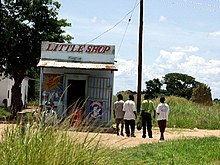Kabwe
Coordinates: 14 ° 26 ′ S , 28 ° 27 ′ E
Kabwe is the capital of the Central Province of the Republic of Zambia and with 191,093 inhabitants (2006 estimate), in the agglomeration 300,000, its fourth largest city. Kabwe is 1172 meters above sea level and 130 kilometers north of Lusaka . It is the capital of the district of the same name, with which it is virtually identical to its agglomeration.
economy
Kabwe lies on an ore vein with a lead content of 20%. Kabwe was founded in 1902 and grew in the 1930s around the newly established local mine and smelter for lead and zinc , but also cadmium , manganese and vanadium . Until 1964, the town was called Broken Hill after the comparable ore deposit in Australia. Funding was granted until 1994. There were no environmental requirements. Zambia Consolidated Copper Mines has since been privatized and left the city. The lead left considerable soil and water contamination. Ore residues are still illegally extracted from the old heaps. Lead levels between 60 and 120 μg / dl were found in children in Kabwe. The record is 300 μg / dl.
environmental issues
In the second largest city of Zambia, around 250,000 people are potentially affected by lead and cadmium pollution. The cause is mining. Because of this, the city has been on the list of the dirtiest places in the world since 2006, published by the environmental organization Blacksmith Institute . The recovery process with the support of the World Bank is making progress, but the effects are still relevant.
politics
Kabwe is the headquarters of the Zambia Railways and is located on the Lusaka – Kitwe route . The city is also well developed with asphalt roads. It is also the seat of Zambia's maximum security prison. The city itself has hotels, hospitals, primary and secondary schools, electricity, drinking water, and sanitation. Kabwe is considered to be the cradle of Zambian democracy because it was here that UNIP was founded, the driving force behind the independence movement from the United Kingdom.
Surroundings and history
In the nearby Mulungushi there is a dam that supplies the mine and town with electricity. The Lukanga Marshes extend to the west of the city . The early human "Broken Hill Skull" ( Homo rhodesiensis ) was found here. In 1985 the Kabwe conference of the South African African National Congress took place here.
Sons and daughters
- Mubabinge Bilolo (* 1953), philosopher and Egyptologist
- Bwalya Stanley Kasonde Chiti (* 1954), diplomat and politician
- Paul Lungu (1946–1998), Jesuit, Catholic bishop of Monze
- Emmanuel Mayuka (* 1990), football player
Others
Lake Kabwe is located in the Democratic Republic of the Congo (compare Lucien Emile Francqui ).
See also
- For a map with all districts and provinces see: Administrative division of Zambia
- On the industrial sociology of Kabwe, see Bruce Kapferer and Lars Clausen .
Web links
- Kabwe Mukobeko Maximum Security Prison
- Kabwe lead report 2005 ( Memento from September 28, 2007 in the Internet Archive ) (English)

